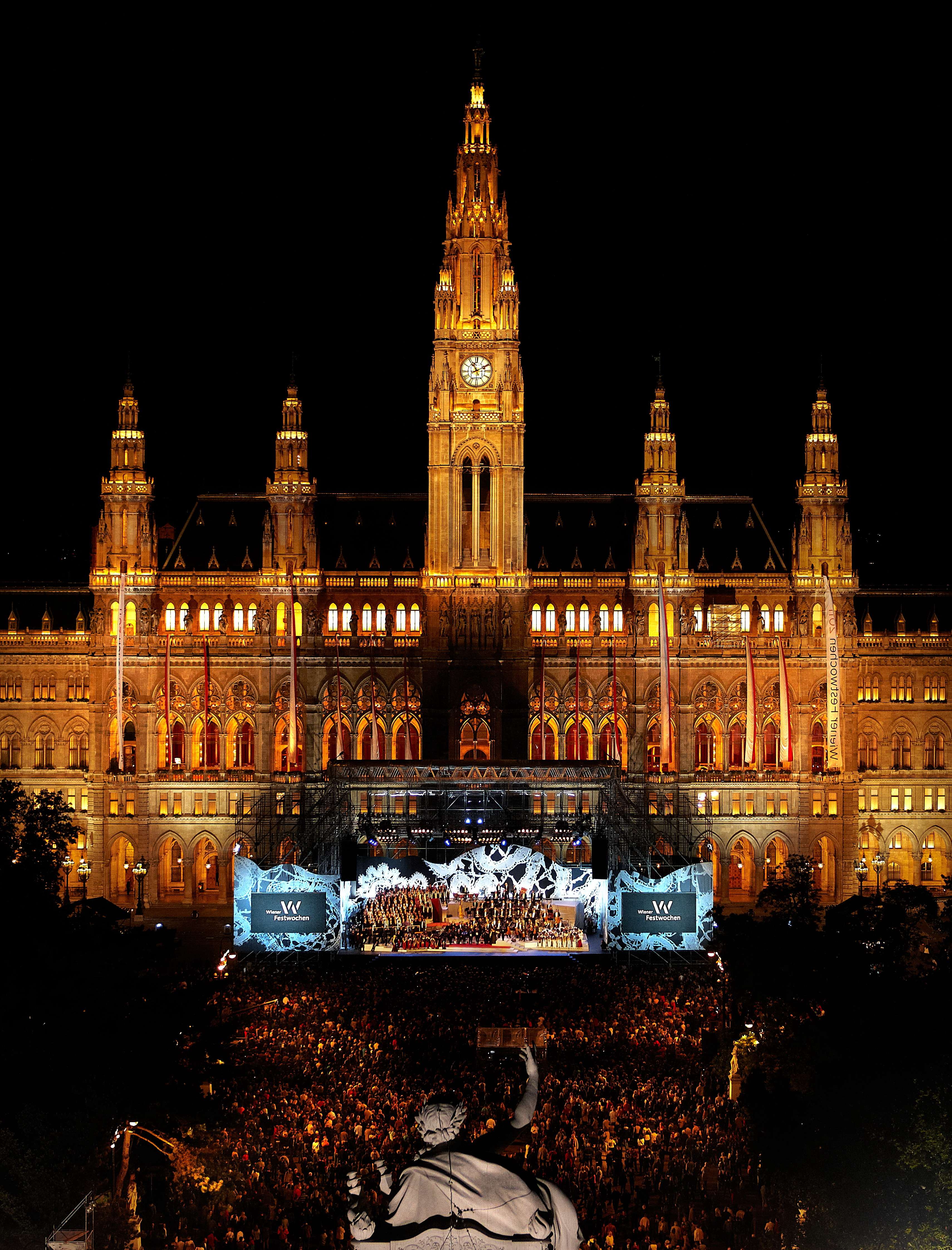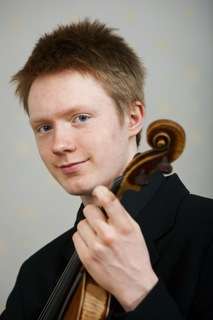|
Back
How Does One Compare Apples With Oranges? Vienna
Rathausplatz
05/11/2012 -
Works by Vladimir Kurjan, Cécile Chaminade, Béla Bartók, Carl Maria von Weber, Pyotr Ilyich Tchaikovsky, Khachatur Avetisyan, Jean Sibelius, and Gioacchino Rossini
Alexandra Dzenisenia (Cimbalom), Jagoda Krzeminska (Flute), Eivind Holtsmark Ringstad (Viola), Michaela Spacková (Bassoon), Dominic Chamot (Piano), Narek Kazazyan (Qanun), Emmanuel Tjeknavorian (Violin)
Mnozil Brass, Martin Grubinger & The Percussive Planet Ensemble, Radio-Symphonieorchester Wien, Cornelius Meister (conductor)

Vienna City Hall (© Mike Ranz)
Europeans follow the Eurovision Song Contest almost as passionately as Americans watch Super Bowl on TV. Less popular is the Song Contest’s sibling, the biennial Eurovision Young Musicians Competition, open to classical musicians under the age of 19. Organized by the European Broadcasting Union, each member country chooses their candidate in national preliminaries. For the fourth time, Vienna hosted this year’s Finale. This coincided with the inauguration of the Wiener Festwochen, a month long festival of music, theatre and arts. Against the splendid backdrop of the Vienna City Hall and with an audience of over 40.000, the young finalists engaged in a truly magnificent musical tournament.
Fourteen young musicians met in Vienna this year to compete in the semifinals on May 5 and May 6. An international jury, headed by Austrian pianist Markus Hinterhäuser, with Polish conductor Agnieszka Duczmal, Norwegian conductor Christian Eggen, clarinetist Carol McGonnell from Ireland, and Czech hornist Radek Baborak, had the difficult task of picking a winner from the seven finalists in last night’s big showdown.
An enthusiastic crowd of music lovers gathered on this warm summer night, waving flags, holding up posters and chanting the names of their favorites. Mnozil Brass, Vienna’s slapstick brass septet, together with the Radio Symphony Orchestra Vienna under Cornelius Meister, opened the concert with their version of Rossini’s Wilhelm Tell Overture.
The first contestant to take the stage was 18-year-old cimbalom player Alexandra Dzenisenia from Belarus. The cimbalom, or hammered dulcimer, is a hugely popular instrument in Belarus. Alexandra played Vladimir Kurjan’s Concertino with enormous virtuosity. Her impressive technique, skillful glissandi and vibrato almost made up for the work’s shallow musical offering.
Next was 15-year-old Polish flutist Jagoda Krzeminska, performing Cécile Chaminade’s Concertino for Flute and Orchestra. A student of Georges Bizet, Chaminade is a little known woman composer of the last century. Jagoda was convincing with her beautiful warm sound, especially in the low registers, and mature sense for phrasing and timing.

E. Holtsmark Ringstad (© Morten Brakestad)
Eivind Holtsmark Ringstad, 17, Norwegian violist, chose the last two movements of Bartók’s Viola Concerto. From the very first pianissimo note of the spiritual 2nd movement, he succeeded in conjuring up an intimate atmosphere amidst the carnival like setting of the open-air event. His flawless technique allowed him to play long legato phrases, even in the softest pianissimo. He performed the folkloristic 3rd movement with drive and energy.
Michaela Spacková, 18, bassoonist from the Czech Republic, performed the 1st movement of Carl Maria von Weber’s unspectacular Concerto for Bassoon and Orchestra with verve and elegance. Her interaction with the orchestra was excellent and her technique immaculate.
The Mnozil Brass entertained the crowd with their hilarious version of Queen’s Bohemian Rhapsody before German pianist Dominic Chamot, 16, took the stage to perform the 3rd movement of Tchaikovsky’s Piano Concerto No. 1. Cornelius Meister and the ORF Symphony Orchestra rushed this promising talent mercilessly through the triumphant finale.
Armenia qualified for the first time in the Finale of the European Young Musicians Competition. Narek Kazazyan, only 15 years old, the youngest participant, enthralled the audience with his incredibly virtuoso performance of Khatchatur Avetisyan’s Concerto for Qanun and Orchestra Nr. 2. The qanun, a member of the zither family, is frequently used in Armenian folk music. Narek’s joy of performing was infectious.
Austrian local matador, violinist Emmanuel Tjeknavorian, 17, was the last participant. He performed the 3rd movement of the Sibelius Violin Concerto. Not worn out from the grueling 1st and 2nd movements, Emmanuel was able to delve into an energetic interpretation of this 3rd movement.
While the jury retreated for its deliberations, the night’s charming host, Austrian percussion sensation Martin Grubinger took the audience on a trip around the world. His Percussive Planet Ensemble, an international troupe of percussionists, performed fireworks for an enthusiastic audience.
The question that loomed large: how does one compare a cimbalom player with a bassoonist, a violist with a qanun player? How does one compare apples with oranges? It finally comes down to personal taste. The jury decided to award Armenian Narek Kazazyan 3rd prize, and Austrian (of Armenian origin) Emmanuel Tjeknavorian 2nd prize. The well-deserved 1st prize went to Eivind Holtsmark Ringstad from Norway.
Apples or oranges – they certainly were all delicious! If these young musicians are the face of tomorrow’s Europe, Europe can surely look forward to a bright future!
Wiener Festwochen
Eurovision Young Artists Competition
Wiebke Kuester
|